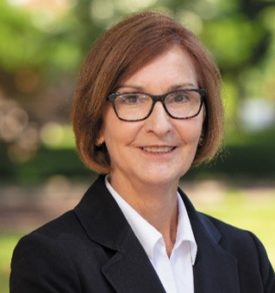February 5, 2020
Dear colleagues,
I write to announce an upcoming leadership change in the New Jersey Agricultural Experiment Station. Dr. Brad Hillman, who for 14 years has served ably as NJAES Director of Research has asked to step down from this role on June 30, 2020. Dr. Wendie Cohick has agreed to succeed Brad in this role. I will make a public announcement of these developments tomorrow in my (final) address to the New Jersey State Agricultural Convention.

Brad Hillman, NJAES Director of Research since 2006, steps down from that role effective June 30, 2020.
First, I offer my sincere thanks to Brad Hillman for his outstanding service as Director of Research, where he has overseen the seamless integration of experiment station research with extension and academic programs with great integrity and diligence. Brad has capably managed the research side of the experiment station during a time of the greatest reduction in state funding to the experiment station over a 10-year period in its recent history.
The NJAES maintains one of the strongest public plant breeding programs in the nation. Under Brad’s guidance, our breeding programs have actually grown, including releases of new varieties of turfgrass, cranberry, strawberry, dogwood, basil, tomato, pepper, peach, apricot, apple, and hazelnut that benefit farmers and consumers in the state, with new licensing revenues that support the future durability of plant breeding at the experiment station. Our outlying stations are stable, and we are now beginning to be able to reinvest in underfunded facilities including Hort Farm 3 and the Cream Ridge farm, as well as others around the state.
Under his leadership, we have made a deliberate effort to connect more effectively our research and extension programs in aquaculture and fisheries in the southern part of the state. In addition, through coordination of research resources to the Haskin Shellfish Lab, commercialization of oyster and other shellfish varieties has increased substantially.
The fertilizer certification program that Brad helped develop in response to the 2011 state fertilizer law is a model for how the experiment station works with the ag and environmental communities to develop a sensible training and certification program that addresses environmental needs but is not overly costly or burdensome to commercial users.
The Center for Vector Biology was created under Brad’s leadership, and under his guidance has continued to grow in depth and breadth in response to the recognition of increasing pressure from invasive species entering the region, and also in recognition of the growing importance of ticks as well as mosquitoes as public health risks.
The Grants Office that serves the school and experiment station, which Brad oversees, has collaborated with the faculty to increase the number of grant submissions processed by more than 100% in the last 7 years, showing the growing awareness among faculty of the need for diversity of programmatic funding, and fulfilling the need to oversee efficiently the pre- and post-award management of competitive grants . This includes developing a sensible approach to external funding of agricultural field trials at our outlying stations that met University requirements while allowing for field trial programs to proceed.
The seamless integration of experiment station research with extension and academic programs is the hallmark of the land-grant system, and Brad’s research leadership has helped maintain a healthy balance among these. I am deeply grateful for his stewardship of the office for almost as long as I’ve been the executive dean. Please join me in sincerely thanking Brad for his yeoman efforts and in wishing him well as he returns to his much-loved faculty roles.
I’m also pleased to announce the appointment of Professor Wendie Cohick to succeed Brad as the next Director of Research for NJAES.

Wendie Cohick, will serve as NJAES Director of Research, effective July 1, 2020.
Wendie has run a federally funded research program since joining the Rutgers faculty in 1996. She currently serves as Chair of the Department of Animal Sciences and has served as Graduate Program Director of Endocrinology and Animal Biosciences. She has been involved in faculty governance of the school, serving as Vice-Chair and (now) Chair of the SEBS Chairs Council. She currently also serves on the Steering Committee that is leading the development of the school’s Strategic Plan.
Wendie conducted her graduate training at major land-grant universities (Cornell and University of Illinois, and her postdoctoral training in endocrinology at UNC School of Medicine at Chapel Hill. The broad scope of her research program is directed at understanding the hormonal regulation of mammary gland physiology as it relates to normal growth, development and lactation and how dysregulation of endocrine systems contributes to breast cancer. She teaches the capstone molecular biology laboratory course in the Biotechnology curriculum at the school.
Please give a warm welcome to Wendie in her new role.
Finally, further announcements will be forthcoming in the next few weeks regarding organizational changes we are planning for the NJAES.
Robert M. Goodman,
Executive Director, NJAES

